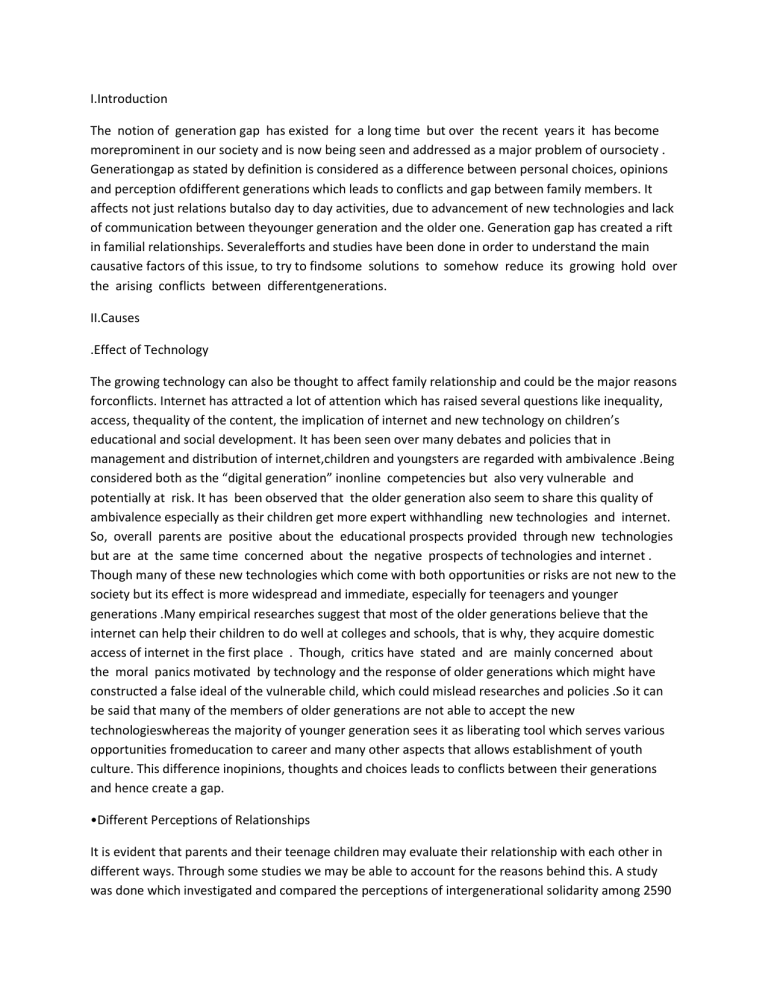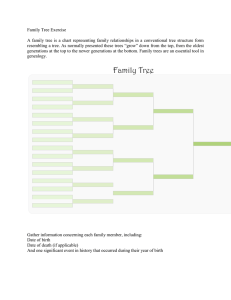
I.Introduction The notion of generation gap has existed for a long time but over the recent years it has become moreprominent in our society and is now being seen and addressed as a major problem of oursociety . Generationgap as stated by definition is considered as a difference between personal choices, opinions and perception ofdifferent generations which leads to conflicts and gap between family members. It affects not just relations butalso day to day activities, due to advancement of new technologies and lack of communication between theyounger generation and the older one. Generation gap has created a rift in familial relationships. Severalefforts and studies have been done in order to understand the main causative factors of this issue, to try to findsome solutions to somehow reduce its growing hold over the arising conflicts between differentgenerations. II.Causes .Effect of Technology The growing technology can also be thought to affect family relationship and could be the major reasons forconflicts. Internet has attracted a lot of attention which has raised several questions like inequality, access, thequality of the content, the implication of internet and new technology on children’s educational and social development. It has been seen over many debates and policies that in management and distribution of internet,children and youngsters are regarded with ambivalence .Being considered both as the “digital generation” inonline competencies but also very vulnerable and potentially at risk. It has been observed that the older generation also seem to share this quality of ambivalence especially as their children get more expert withhandling new technologies and internet. So, overall parents are positive about the educational prospects provided through new technologies but are at the same time concerned about the negative prospects of technologies and internet . Though many of these new technologies which come with both opportunities or risks are not new to the society but its effect is more widespread and immediate, especially for teenagers and younger generations .Many empirical researches suggest that most of the older generations believe that the internet can help their children to do well at colleges and schools, that is why, they acquire domestic access of internet in the first place . Though, critics have stated and are mainly concerned about the moral panics motivated by technology and the response of older generations which might have constructed a false ideal of the vulnerable child, which could mislead researches and policies .So it can be said that many of the members of older generations are not able to accept the new technologieswhereas the majority of younger generation sees it as liberating tool which serves various opportunities fromeducation to career and many other aspects that allows establishment of youth culture. This difference inopinions, thoughts and choices leads to conflicts between their generations and hence create a gap. •Different Perceptions of Relationships It is evident that parents and their teenage children may evaluate their relationship with each other in different ways. Through some studies we may be able to account for the reasons behind this. A study was done which investigated and compared the perceptions of intergenerational solidarity among 2590 adult child/older parentdyads from the national survey of families and households .This study indicated that there is a high degree of disagreement on how parents and their children view their relationship. It was observed that parents usually reported better relationship quality whereas the children reported better contact and exchanges of assistance,but not as positive relationship quality as stated by their parents. The variables found to influence the correspondence between the two generations were age, child’s marital status, gender and residential proximity. It is known that familial relationships between a parent and a child is amongst the most importantrelations and is a major contributor to the emotional and psychological well-being of both generations ,Associated with different assistance between both the generations .A study suggested that though there is agreement on certain aspects between different generations but parents are likely to perceivetheir relations with their children positively .Recent works have examined the social, structural aspectsof intergenerational relationships in later life which suggests that “societies and individuals within them areambivalent about relationships between parents and children in adulthood”.The contradiction according to this study was because of desires for personal autonomy and dependence. Thusthe parent- child relationship in adulthood is viewed as irreconcilable contradictions at social levels likestatuses and norms .It was also seen that parents and children will have more similar reports if they weregiven congruent expectations, positions and resources in society.To overcome this problem, researchers should address the quality dynamics of intergenerational relationships along with recognizing that multiple perspectives are important so that the problem could be understood in a better way and possible solutions could be found. .EFFECTS OF CULTURAL VARIABLES It has been observed that cultural values does have an impact on generation gap since it is considered both a social and cultural construct as observed in the survey below. It has also been observed that generation gap is a phenomenon accepted by Americans but it still baffles parents from Asian countries[20].Traditionally,Asians tend to live in joint families where family is hierarchical. Many generations live together. Age, gender and generational status of family members are major determinants of behavior and relational roles[21].Generally, a high importance of conformity is seen. Inter-dependence is promoted and self- identity is inhibited[22]. Being conservative is encouraged, the welfare and integrity of family is given more importance over individuality.[23] whereas western culture supports self- identity and nuclear family system in middle class. Due to globalization and access to different cultures, The Asian teenagers have been able to have a lookat western familial relationships which is far more relaxed as compared to Asian families, this creates adifference in opinions between the teenagers and their conservative Asian parents and adds to the already present generation gap and causes conflict. .LACK OF COMMUNICATION Lack of communication is one of the major reasons for generation gap.Parents are highly pressurized to strike a balance between work and family, though they do it to earn a better living for their children but they forget that this costs them the time with their children. Most of their time is spent on heavy work load and stress in the work place. On the other hand, children do not share their school life and everyday events with their parents, which on the whole leads to parents making huge sacrifices to earn a living but the children are being neglected at the same time, this causes communication barriers in the familyand adds to generation gap.




